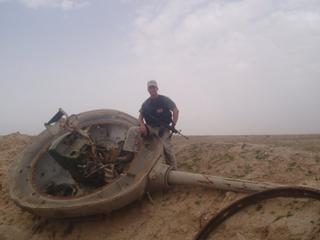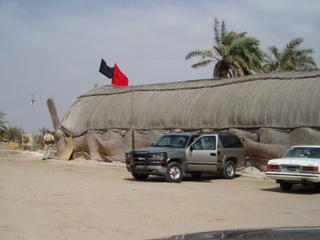

It is 11pm on the 12th of February. I've just realized Valentines Day is in another 2 days and that I don’t have any way of sending my wife a card or flowers. I think she’ll understand, considering the circumstances. For those of you who do not already know, Andrea is also deployed in support of a separate NCIS mission in Kuwait City, Kuwait. She recently arrived and sent me an email stating she is residing in a comfortable apartment rented by NCIS for those agents supporting "Team Kuwait." She has maid service and a satellite TV, but won't have much time to enjoy it with all of the work ahead of her. There are a variety of missions Andrea will be conducting in the next 90 days that will certainly be considered a "once in a lifetime experience."
While it is unlikely Andrea will make it very far into Iraq, there is a much higher likelihood that I may get a chance to see her in Kuwait if our principal (the Ambassador) decides to take a vacation from Al Basra. Whether it is a trip home to England, or an official call back to visit his superiors, his departure leaves us with the opportunity to drive south through the desert down to "Navstar", the checkpoint/refueling station at the Iraqi/Kuwaiti Border, just above Camp Doha.
During our first drive from "Navstar" to the CPA in Basra, we passed hundreds of military vehicles, dozens of personally owned trucks and cars (some which you can't believe run), and many donkey carts loaded with items ranging from LP gas containers to freshly slaughtered sheep. The road is littered with debris - abandoned vehicles, dead animals, trash, even rusted tanks and personnel carriers left over from Desert Storm '91. It's easy to spot a "Desert Storm" casualty from an "Iraqi Freedom" casualty by the condition of the paint on the vehicle and the location of the vehicle. Most of the Iraqi Freedom armor was abandoned before being destroyed and still sits adjacent to the vehicular fighting holes prepared by the Iraqi troops. Conversely, the majority of the rusted remnants from Desert Storm were blown into pieces while attempting to make a stand against our far-superior tanks and weaponry. Many a tank turret still lie next to their undercarriage, blown off by laser guided missiles or M-1 Abram Tank rounds. Quite a few have "DU" visibly spray painted on their sides, signifying they were hit by depleted uranium rounds, which left dangerous levels of radioactive materials inside the tanks.
It's hard to accurately describe the city we travel through on a daily basis. Recent rains have turned entire neighborhoods into lakes. Shoddy brick structures, which wouldn't qualify as backyard sheds in the U.S., serve as permanent residences to the 2 million residents of Basra. Most appear half finished, and you wonder in amazement how anyone could comfortably live inside without the constant fear that the structure will collapse around them. As you leave the city, the desert opens up and is dotted with large tents, mostly owned by the homeless Bedouins, or stateless people. The funny thing is that these people have permanently moored propane tanks and satellite dishes next to their tents. Something must ring true in the phrase "location, location, location". All across the desert, one sees long hills of piled dirt embankments stretch hundreds of miles North to Iraq, the work of Iraqi soldiers preparing for the "mother of all battles." Dozens of these embankments still have ditches inside which were meant to be filled with oil and set afire in hopes of staunching the movement of US Armor Northward.
Back to current events - our team escorted the Ambassador and his Aide to the Al Zubayr Police Academy yesterday to view the ongoing training of the new Iraqi Police Force by coalition members. A mixture of Brit, Finnish, Czech, and Italian civilian and military police are attempting to teach the Iraqi's the basics of policework and human rights. It amazes the training staff how foreign the concept of human rights is to an Iraqi. In the U.S., beatings of prisoners are against the law. In Iraq, it is not only tolerable, it is expected. This is what keeps them in line! Another concept unfamiliar to the typical Iraqi cop is "evidence." Although the Iraqi cops know they can seize contraband, be it drugs, weapons, latent fingerprints, etc, they fail to understand that the evidence can be used to convict the person. The average Iraqi cop seizes the evidence only because the contraband gives them reason to suspect a person of a crime. (remember - there is no such thing as sending the evidence to a lab for fingerprint analysis, etc. That technology just doesn't exist anymore, if it ever did). With contraband, the cop can now freely beat their prisoner until the person gives a confession. In Iraq, the confession proves the crime, not the seized items. So much for the poor sap who happens to have "evidence" dropped in his car or home. He'll be beaten until he confesses that the stuff was his, or worse.
We were assured the Police are slowly beginning to see the error of their ways, though that may only be lip service so they can graduate and earn a paycheck. It will be several years before all of the Iraqi Police force is trained by coalition forces, and perhaps longer before we realize whether the concept of human rights fits into the new Iraqi society.
No comments:
Post a Comment